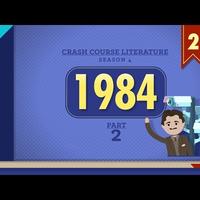George Orwell's 1984, Part 2: Crash Course Literature 402 - YouTube (2)
There's no question that something is lost when you choose to make any part of your ownlife
public.
Winston can't turn off his telescreen.
Many of us choose not to turn ours off , exposing a lot of our ownlives to surveillance, and
I believe that does ultimately shape our lives.
It's certainly not a 1984-level control of the private self--but it is worth considering.
In our era, for those of us lucky enough to live in democracies, Big Brother is not a
totalitarian government, able to alter the consciousness of its citizens through various
forms of torture.
Instead, Big Brother is each of us.
We are watching each other--in the best ways, and the worst ways.
Does this distract us from our physical bodies, our animal desires, our bonds with real life
family and friends, our impulses to help others (you know… that business of being conscious
and human)?
Or does it ultimately enhance our humanity?
I don't know.
But I don't think time spent considering those questions is wasted.
And that's Orwell's true genius: The questions that he asked in 1949 about a hypothetical
1984: they're timeless.
What is the nature of humanity?
Which social orders best allow humanity to flourish?
Which oppress it nearly beyond recognition?
And what is the role of language and literature in liberating the oppressed?
Keep asking those important questions and you will be “Orwellian” in the most heroic
sense of the word.
Thanks for watching.
I'll see you next time.

